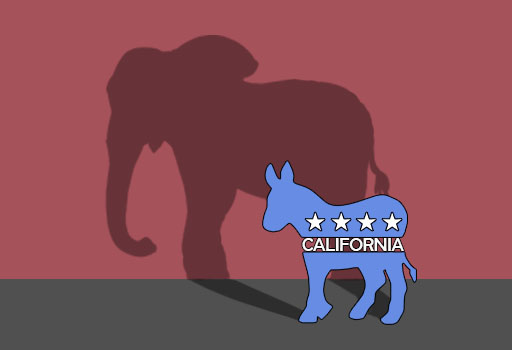California’s true nature masked under blue shadows

Graphic illustration by Kavya Iyer
Although at first glance California seems like a Democratic stronghold and a haven for liberals, closer examination reveals a more complex situation.
February 3, 2021
California has been considered a Democratic stronghold since the 1990s. Many Republicans even go so far as to label California as a “socialist” state and a haven for communists due to its liberal reputation. Realistically, though, how well does California live up to these lofty claims? While California has made national headlines for its progressiveness, the state’s actions on a multitude of issues seem to present a different story.
“Our state is arguably facing a lot of issues for a state that a lot of people idolize,” junior Archana Pisupati said. “I feel like despite the fact that we are framed in this picture perfect paradise that seemingly has no issues, we are the ones who are trying to cover them up instead of combat them.”
In the 2020 election, California voters actually sided with Republican views on 7 out of 13 of the propositions that were on the ballot. Of these seven, Propositions 16, 21 and 22 are of particular relevance, as they relate to overcoming racial barriers and helping low-income families, both of which a “liberal” state such as California should theoretically support. California’s liberal reputation creates the illusion of a state government and citizens that are active in supporting and creating social and political change. In reality, though, election results seem to line up more with conservative, or socially “traditional,” results.
California voted no on Prop 16, meaning that race will not be considered as a factor in public employment, public contracting and public university admissions processes. Latinx and Black students have been severely underrepresented on college campuses for years, and the rejection of Prop 16 means a step backward in attempting to level this tilted playing field.
California also voted no on Prop 21, meaning that city governments will not be able to set rent control on all property and as a result, will not be able to limit drastic rent increases from year to year. This proposition would have affected local tenants in the Bay Area, as many currently live in dated houses that do not warrant their current sky-high rent. If the proposition had passed, landlords of such properties would have made significantly less. This vote particularly impacts low-income families because this proposition would have helped them drastically by providing them housing stability and affordability, something that is especially important during the pandemic as COVID-19 has increased financial struggles.
Additionally, California voted yes on Prop 22, allowing apps like Uber and Lyft to no longer classify their drivers as employees, but rather as independent contractors. While this result may be partly due to confusing wording on the ballot and Uber and Lyft’s multimillion-dollar advertising blitz, it is a major victory for big business over low-wage workers regardless. Prop 22 provides these companies with a justification to avoid their obligation to provide benefits and minimum wage pay for their workers while still making incredibly large profits. Many of the drivers on these apps are from low-income families, and taking away minimum wage, health insurance and unemployment benefits leaves these families more vulnerable than ever.
“If you are a liberal, this result is frustrating because it works to disenfranchise specific workers’ rights,” Economics teacher Steven Hsu said.
While all these results contradict the state’s liberal reputation and seem to be more in line with conservative policies, there were still some progressive results. Californians voted yes on Prop 17, which restored the abilities of former felons to vote once their prison terms have ended, as well as no on Prop 20, which would have resulted in stricter parole and sentencing guidelines. This is not the first time the state has voted conservatively on some issues and liberally on others. In 2008, California voters approved Prop 8 to ban same-sex marriage before it was eventually overturned by the Supreme Court. In the same election, they voted against measures that would require minors to notify a parent or guardian before getting an abortion. In 2016, voters legalized marijuana but refused to ban the death penalty. This range of election results shows that the state has never been as liberal as it was made out to be.
Taking a closer look, California likely only became a Democrat stronghold after Proposition 187, a measure that denied public services to undocumented immigrants, was passed in 1994. This resulted in the political awakening of many immigrants who were outraged at this measure and dramatically changed the state’s electoral politics. The dichotomy is the result of the fact that many immigrant families are socially conservative but vote blue. Due to their cultural background, minorities tend to be less likely to vote liberally on measures that will not impact them but do vote liberally on measures that benefit their ethnic group. For example, many Asian Americans do not support affirmative action because they feel as though it puts them at a disadvantage in comparison to other minority groups who would benefit. Each minority group primarily looks out only for itself rather than the larger immigrant community, causing divides regarding which progressive measures are passed and which are not.
In the Lynbrook community, which is generally considered fairly liberal, this split is painfully obvious, likely due to the influence of students’ immigrant families. However, some students go so far as to be plainly racist and discriminatory, partly due to acceptance of the Asian model minority myth.
“To a certain extent, the majority of Lynbrook staff and students are liberal and do what they can to express the importance of serious social issues,” Pisupati said. “However, some individuals honestly just confuse me — making fun of tragedies, jokingly using slurs and creating unsafe environments by the means of ableism and other xenophobic behavior completely contradicts the means of any democratic values one may have.”
Aside from election results, there are many other issues, primarily financial policies, that show California is far from liberal. California has progressive income tax, meaning that its taxes have a maximum cap of 12.3% for people making over $599,013 a year and as low as 1% for some of those making less than $8,932 a year. However, thanks to the statewide sales tax that is usually compounded by local sales taxes, even the poorest people in the state end up paying at least 8.25% of their income in taxes to the state. On the contrary, property tax is extremely low, as it is constitutionally protected at a maximum rate of 1%. Most Californians do not have the financial means to own a home, and, as a result property tax is increasingly becoming a tax only for the rich, yet it is kept low.
“Quite often, the media tends to portray California as a socially progressive state, but when it comes to fiscal policy, it gets a lot more complicated,” Hsu said.
California’s housing crisis hurts the same groups of people as do its tax policies. Most property-owning Californians tend to oppose anything that will bring down the value of their property, leaving the majority of Californians who do not own property with incredibly high rent and housing costs. For example, in 2016, Lynbrook parents rejected a proposal to expand the school boundaries in order to address the declining enrollment crisis. The proposal would result in feeding in students from lower-income neighborhoods, which Lynbrook parents believed would decrease their property’s value.
Property-owning Californians also tend to be against concepts such as high-density apartments. The city of Cupertino, as a result, has a law against buildings that are four stories or higher. Policies like this restrict the supply of housing even as the demand for housing continues to grow. Due to the increased demand, housing prices continue to rapidly increase, making living costs in California continuously more unreasonable.
“I had colleagues who were working Uber in addition to their day job just so that they could afford their own apartment rent, as well as many that opt for housemates to split rent with,” Hsu said. “We’re in a situation where it just isn’t affordable.”
Although California is not acting in ways to minimize the housing crisis, that does not mean there are no residential developments. There are developments, just for the wrong crowd. California developers are notorious for demolishing buildings in poorer areas to replace them with upscale housing that the previous inhabitants would not be able to afford. This pattern is perpetuated by the Ellis Act, which allows rent-controlled housing owners to evict everyone, demolish the building and then put up pricey condos or sell the property. Based on data from 2012 to 2017, 5 of the top 20 most-gentrified U.S. cities are in California: San Francisco-Oakland, San Jose, Sacramento, Los Angeles and San Diego.
California is renowned for leading technological innovation, but what is not advertised is that many Bay Area cities are suffering due to the gentrification that large tech companies have brought with them. Facebook offers an employee bonus of $10,000 for those who decide to move closer to the company, further accelerating the gentrification of East Palo Alto. Many tech companies take advantage of low-income communities such as those in East Palo Alto because of the cheap land that allows them to expand their headquarters, resulting in low-income families being pushed out.
“You would think that we would look to institute rent control as a means to combat a little bit of this gentrification process, where people are being priced out of living in the area, but yet again, measures that you might assume a liberal [state] would take did not go through,” Hsu said.
While California addresses some social issues, more often than not, the state tends to protect the rich from making any sacrifices, letting the working class and underrepresented groups suffer in the process. California is far from a “progressive utopia,” and if Californian citizens, as well as the rest of the world, continue to turn a blind eye to the reality of the situation, there will be no progress in working towards equality, both in terms of social issues and class divide.



































































